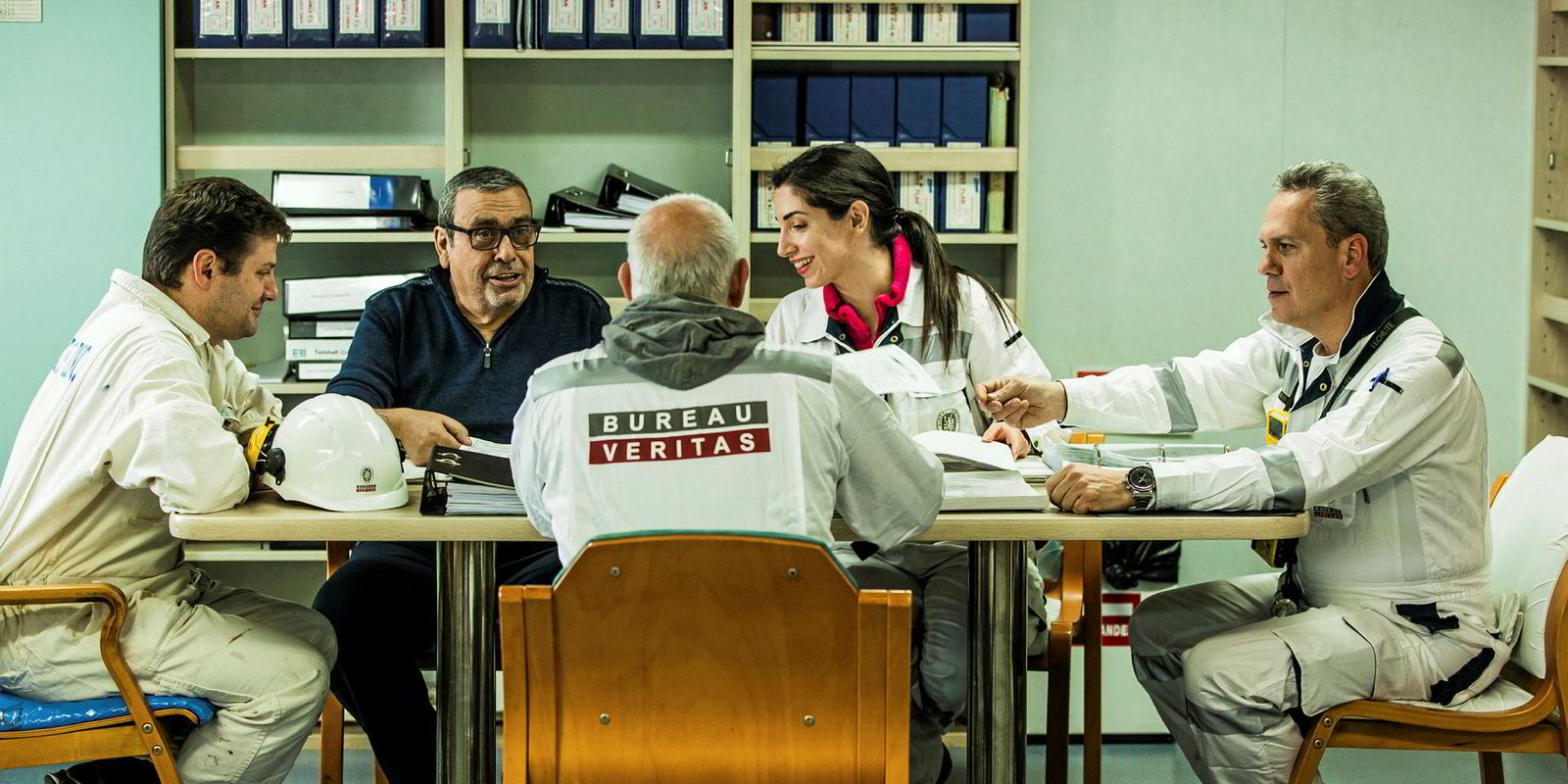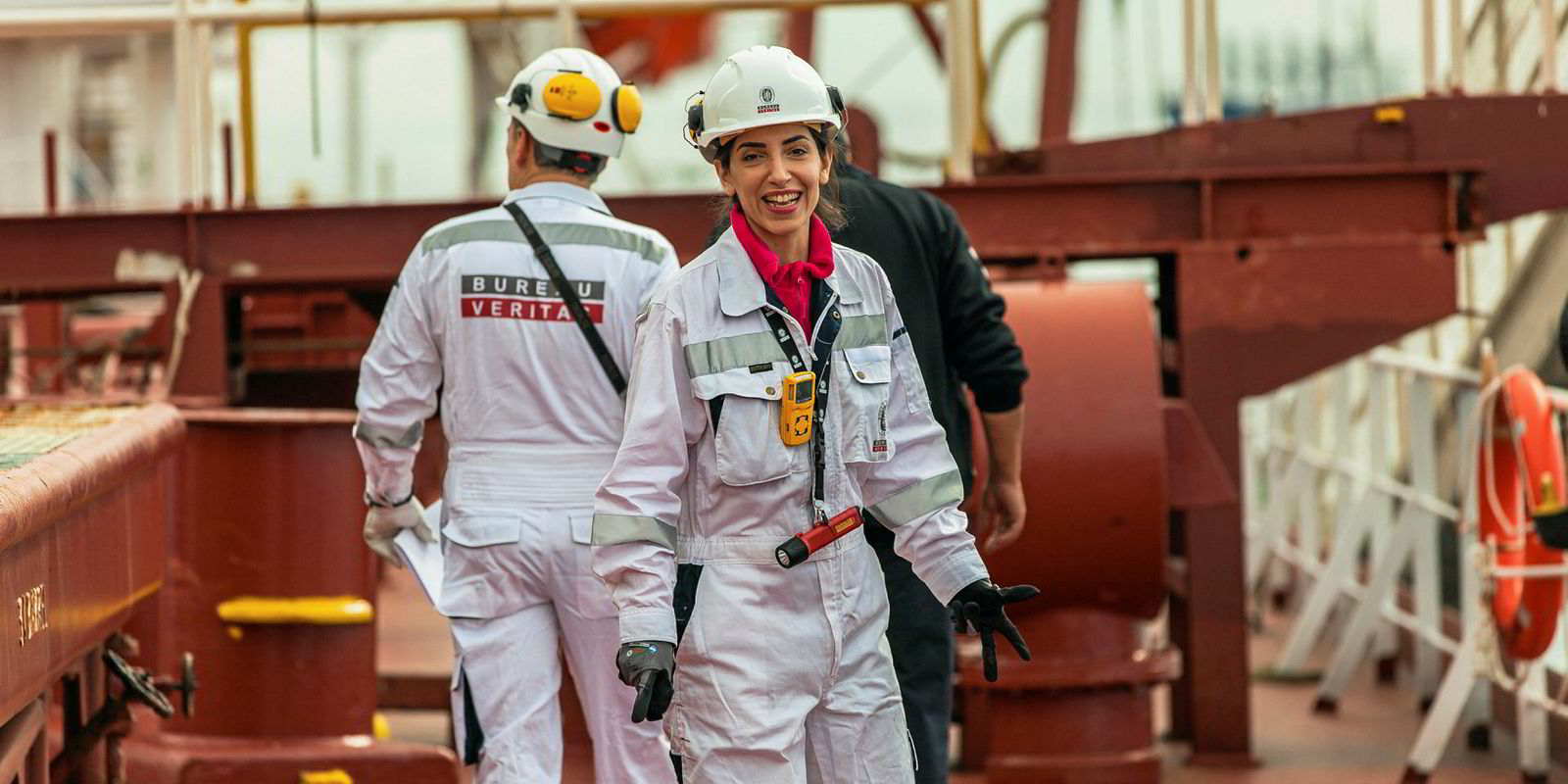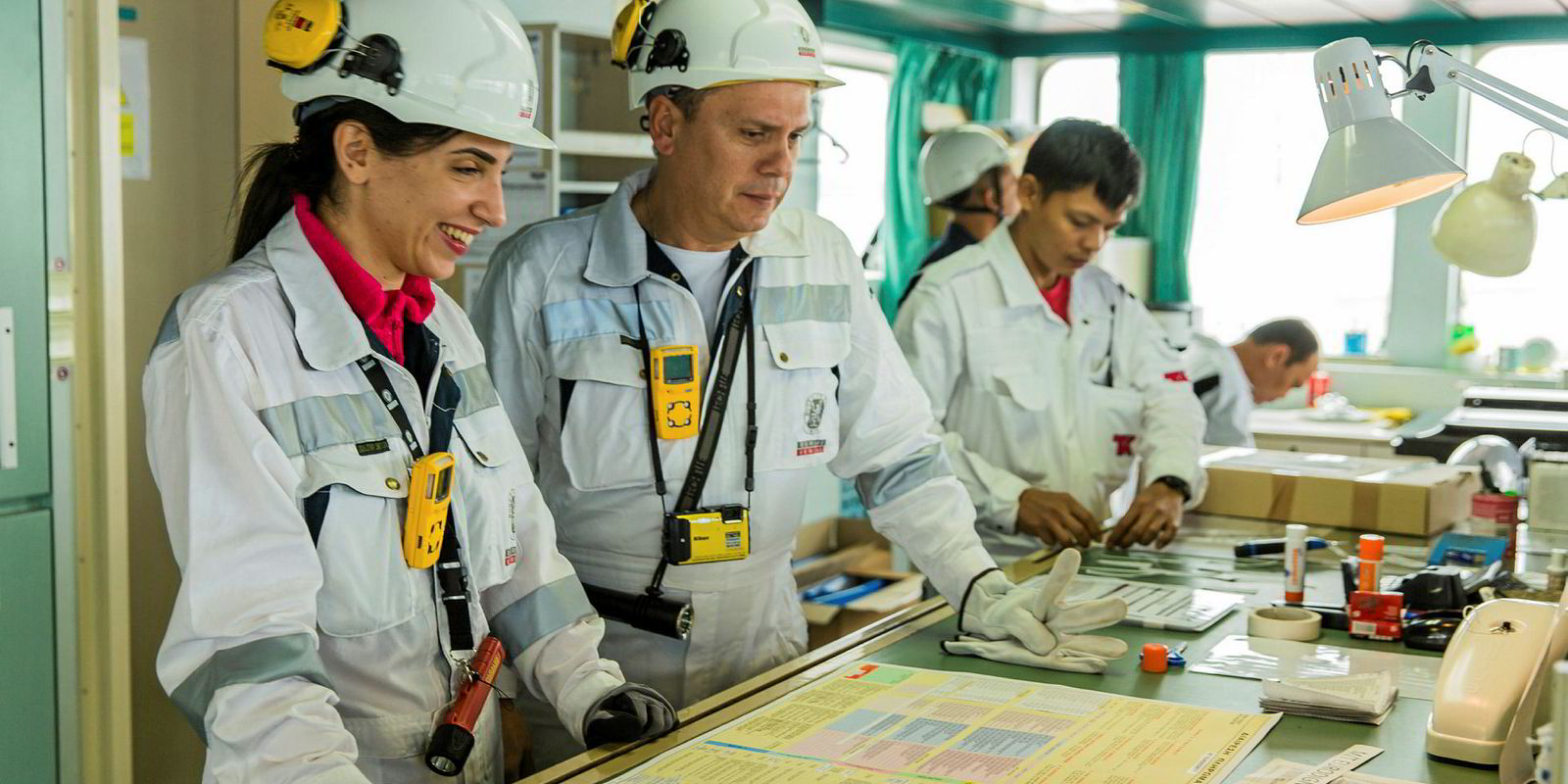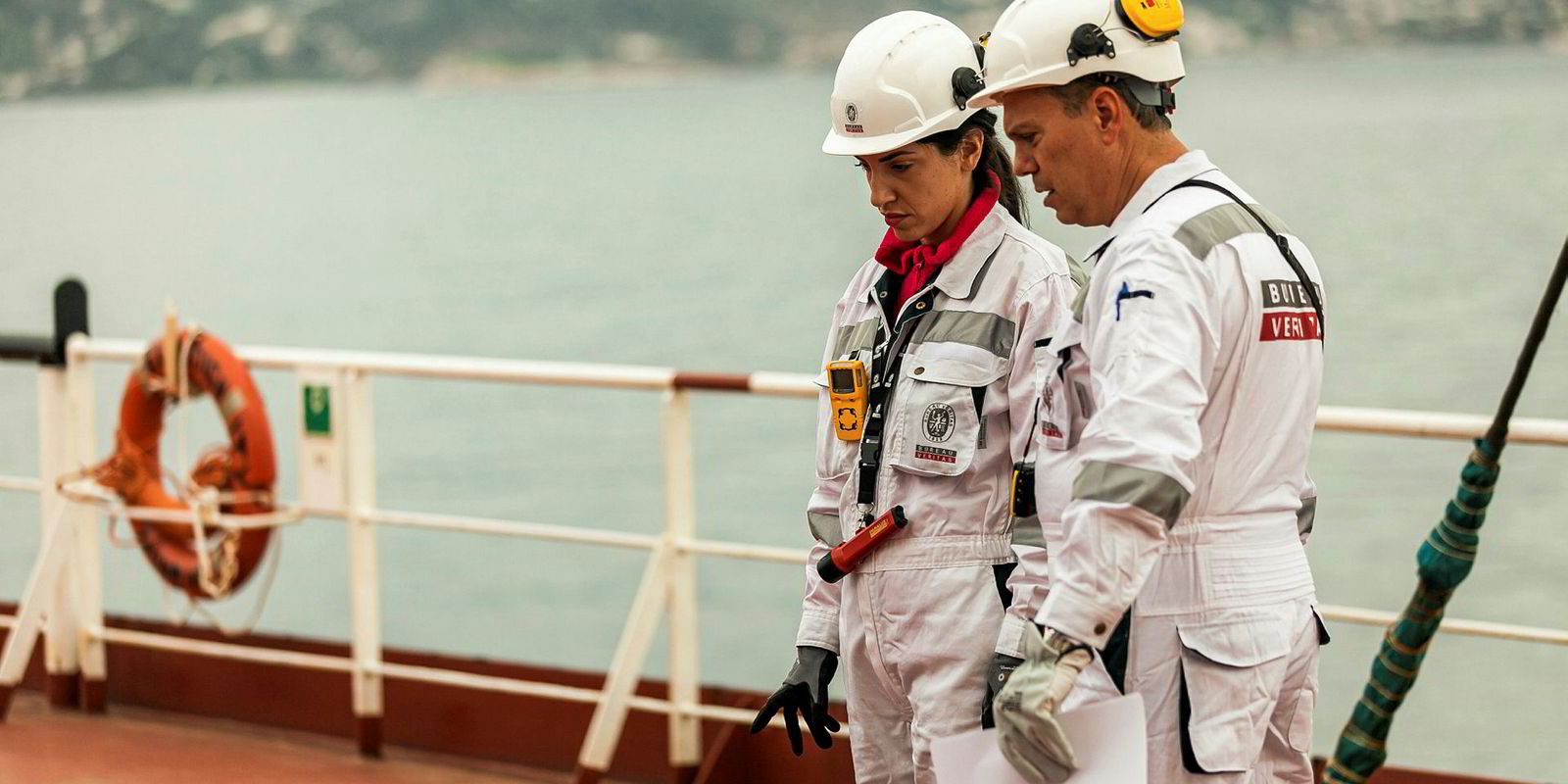Zoe Anastassopoulou is on her way out to a 13 year old suezmax tanker anchored off Piraeus whose ownership changed 18 hours earlier. She is accompanying Mike Kasmas, Bureau Veritas (BV)'s ship in service operational manager in the city, as well as two surveyors who will be conducting the transfer of class surveys required to bring the ship into service as fast as possible.
Eurodignity was recently acquired by her new owner, and the manager, Eurotankers, now has its own crew on board. The ship’s name has already been repainted and the class marks changed they now show a "B" and a "V" on the load line markings on port and starboard mid-ships.
While Anastassopoulou's role is mainly office-based, she is acquiring the necessary theoretical qualification for performing ship in service surveys.
Today, she is supporting the BV team in completing the paperwork with the crew and the shipmanager’s technical team, and Kasmas is attending in his management role, responsible for all BV’s Hellenic and Black Sea Area survey operations, and to train Anastassopoulou.
Anastassopoulou is starting out in her shipping career, and it’s tough to get going. Shore-based shipping jobs are hard to come by in Greece today and practical operational skills are required.
Her naval architecture degree from the National Technical University of Athens now needs to be matched by real-world experience. As a woman in a technical support role, she remains a minority in a male-dominated business. The experience today is one of many important steps in her maritime industry career development.

Attending a ship in the Greek shipping capital is useful to develop her understanding of what is required during surveys, to complete her practical training and to achieve the status of ship in service surveyor. Meeting clients’ teams is another important element of going onboard ships.
Transfer of class surveys is an important but relatively straightforward, process. The International Association of Classification Societies (IACS) has streamlined the procedure, but the key is providing confidence to the client, which is focused on a smooth transfer of ownership and the ability to start trading as soon as possible with all the required class and statutory certifications validated.
When a client decides to transfer a ship to Bureau Veritas class, a dedicated expert is assigned by BV in the closest office to be the primary contact for a smooth transition.
First the ship’s manager collates the information required for the classification file and ship drawings, if necessary, and informs the flag administration. Once onboard, the BV surveyors, accompanied by Kasmas and Anastassopoulou, are able to perform the required class surveys to effect the change of class.
The transfer by launch from Piraeus harbor takes them out to the ship early in the day. The surveys they perform are essentially the same as those required for a normal annual survey but adjusted to reflect the age and type of ship.
As the Eurodignity was built in 2004, it is surveyed for items under IACS’ Enhanced Survey Program (ESP), focused on structural condition and piping that would not need to be examined in tankers or bulkers less than 10 years old.
The normal scope of an annual survey includes many elements for the team. Anastassopoulou accompanies the surveyors as they make a visual inspection of the hull and a general examination of essential machinery.

The machinery inspections include the engine-room telegraph, arrangements for bilge pumping, electrical systems, electrical power and lighting systems and operation of the emergency generator. Tests are carried out on fuel and lube oil quick-closing valves as well as ventilation and fuel oil pump electrical trips and fire pumps.
To satisfy ESP requirements, the cargo tanks must be surveyed by two fully qualified surveyors, so the BV team enters No 4 tanks, port and starboard, as well as a selection of ballast spaces including fore and aft peak tanks. All are found without any apparent defects and with coatings in good condition.
As well as changing class, the ship is changing flag to Liberia. Again, the new flag requires the same scope as an annual statutory inspection. On behalf of the flag, the requirements for Loadline, Marpol and Solas convention certification are surveyed.
The whole process is supported by BV’s end-to-end smart and digital applications, including My Jobs and My Veristar.
The ship meets all the requirements of class and flag, and BV is able to issue interim certification that will be replaced by final certificates in due course. If requested, e-certificates can now be issued on behalf of 52 flag states; digital certificates now represent 72% of BV’s classed fleet.
The ship is now fully in BV classification and free to trade, and Anastassopoulou has had an interesting day building experience.
“How can you not want to be involved with the ships themselves?” she says. “I am not following the path of a ship surveyor but I was impressed from day one. The shipping world is full of surprises, action and excitement. Every day is different.”
She may have a slightly smoother path than BV’s regional chief executive for the Hellenic and Black Sea Region, Paillette Palaiologou, who also started in a technical support role before rising to prominence with the classification society.
Palaiologou recalls of her first position with Oceanbulk, the bulker owner: “When I started, I had to convince my principals to let me visit the ships. It was only by going during the weekends to our ships stopping for repairs in Kinossoura, Perama and docked at Elefsis, Skaramaga or Avlis shipyards that I could get onboard.

“But I felt, and I know I was right — persistence would be the only way. And I was lucky that my first job was in a company where the owners and managers were willing to give me the chance.
“Eventually I was given more responsibility beyond my purchasing role, including official jobs on ships in dock. I can remember the challenge of being in charge of a ship repair that required 800 tons of steel replacement in South China — that was a big job with a lot at stake, working with the yard and class to get the job done properly and on time. Ultimately I was made responsible for hull maintenance across the fleet.”
Palaiologou says BV took Anastassopoulou on because it needs technical people with the capabilities and dedication that make them keen to understand what clients need and the nature of their business.
“There’s no substitute for going onboard,” she says. “So now we are pushing Zoe out to the ships whenever we can. But the reality is that with 85% of our marine surveying activities by our Greek-based surveyors taking place all over the world, we have to grab these opportunities in Piraeus for Zoe when we can.”



